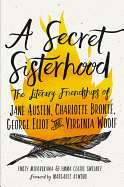
After a year of friendship, Emily Midorikawa and Emma Claire Sweeney divulged their individual secrets: each had ambitions to be a writer. Instead of the competition and sniping that is a stereotype of female friendships, they encouraged and supported each other. Why then, they wondered, do we have so few stories of literary women's relationships?
Midorikawa and Sweeney scoured surviving documents to find such records of Jane Austen, Charlotte Brontë, George Eliot and Virginia Woolf, and collected them in A Secret Sisterhood. These relationships have been ignored by history; the book features never-before-seen details of the private lives of beloved authors. Often, their writer friends became their most astute critics.
Jane Austen found a kindred spirit in playwright Anne Sharp, her niece's governess, ignoring the social stigma of befriending her family's employee. Charlotte Brontë may have stayed a schoolteacher if not for Mary Taylor's encouragement, and Taylor's political opinions became an influence on her work. Though George Eliot and Harriet Beecher Stowe communicated in letters from different sides of the Atlantic, no one else could relate to the pressures of fame both endured. Virginia Woolf and Katherine Mansfield shared a gossipy rivalry, though they were each other's intellectual equal in a relationship that bordered on romantic.
A Secret Sisterhood serves as a feminist biography of its subjects, and gives insight into the writing of their most enduring works. These women shared their personal and professional lives with each other, and the connections are deep and human. Here is new perspective on women we thought we knew, and on female friendship overall. --Katy Hershberger, freelance writer and publicist

